|
|
|
Sort Order |
|
|
|
Items / Page
|
|
|
|
|
|
|
| Srl | Item |
| 1 |
ID:
141250
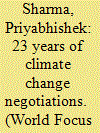

|
|
|
|
|
| Summary/Abstract |
Over the decades, climate change has emerged as an established wisdom of contemporary times. This has happened merely in the span of last three decades. Prior history of the science of climate change was full with controversy and debate. When at the turn of the nineteenth century the Swedish chemist Svante Arhenius (1896) proposed this hypothesis for the first time that man-induced carbon dioxide in the atmosphere of earth would lead to an increase in surface temperature through the greenhouse effect, not many took him seriously. To believe that the climate of earth was changing at a pace and scale far greater than the routine characteristic change forming part of the geological history of earth was too farfetched a contention at that time. For about next half a century as a result of some evidence it came generally to be agreed upon that some sort of climate change was happening but it still remained largely unclear whether this change had been happening in the direction of global cooling or that of global warming.
|
|
|
|
|
|
|
|
|
|
|
|
|
|
|
|
| 2 |
ID:
124605
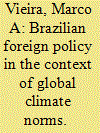

|
|
|
|
|
| Publication |
2013.
|
| Summary/Abstract |
This article is an enquiry into Brazil's evolving responses to global climate change norms. Following an overview of the evolution of international normative frameworks of climate change governance, I examine the relationship between some of these international norms and domestic environmental politics in Brazil. Internationally, the analysis focuses on the North/South political debate about climate change and its role in shaping understandings about the impact and responses to global warming. Domestically, I explore the evolving relationship between state and private actors in the decision-making process. I argue that Brazil's official position on climate change negotiations is currently influenced by a nationalist/developmental approach based on the particular worldview of the dominant faction within the foreign ministry and backed up by private groups, powerful sectors in the military establishment, key ministries, and the presidency. Yet, this worldview has been increasingly undermined/permeated by other state and nonstate actors, who are more closely aligned with the environmental concerns of international stakeholders. The ensuing domestic conflict has important implications for the legitimacy and coherence of the Brazilian position in international climate change negotiations
|
|
|
|
|
|
|
|
|
|
|
|
|
|
|
|
| 3 |
ID:
193559
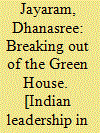

|
|
|
|
|
| Publication |
New Delhi, KW Publishers Pvt Ltd, 2012.
|
| Description |
xx, 235p.hbk
|
| Standard Number |
9789381904138
|
|
|
|
|
|
|
|
|
|
|
|
Copies: C:1/I:0,R:0,Q:0
Circulation
| Accession# | | | | | | | | | | | |
| 060484 | 363.73874/JAY 060484 | Main | On Shelf | General | | | | | | | |
|
|
|
|
| 4 |
ID:
141245
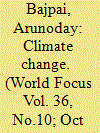

|
|
|
|
|
| Summary/Abstract |
There is no need to emphasize the fact that the climate change crisis is a major global challenge of our times. However, the climate change crisis is insurmountable, once it crosses the threshold. It threatens not only our present generations but also the future of entire humanity. The impacts of climate change, once set in, are not reversible in the short run. The assessment of the global warming trends and their likely adverse consequences is made by the Inter-Governmental Panel on Climate Change in its five Assessment Reports published respectively in the years 1990, 1996, 2001, 2007 and 2014. The gist of these reports is that the global mean temperature has increased by 0.3 to 0.6 degree centigrade in last 100 years but it is likely to increase by 0.3 C per annum in 21st century. The Synthesis Report of the Fifth Assessment Report (IPCL: 2014) remarks, 'Continued emission of greenhouse gases will cause further warming and long-lasting changes in all components of the climate system, increasing the likelihood of severe, pervasive and irreversible impacts for people and ecosystems'.
|
|
|
|
|
|
|
|
|
|
|
|
|
|
|
|
| 5 |
ID:
141246
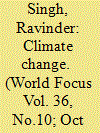

|
|
|
|
|
| Summary/Abstract |
Climate Change is a serious global environmental concern. It is primarily caused by the building up of Green House Gases (GHG) in the atmosphere. The global increases in carbon dioxide concentration (CO2) are primarily due to fossil fuel use and due to agriculture land use change yielding the methane and nitrous oxide. Global Warming is a specific example of the broader term “Climate Change”. It refers to the observed increase in the average temperature of the air near earth’s surface and oceans in recent decades. It is adversely affecting particularly the developing countries because they have neither the capacity nor the resources to deal with this challenge threatening the human existence (1). Scientific studies have proved the global atmospheric concentrations of most important Green House Gases-carbon dioxide (CO2), methane (CH4) and nitrous oxide (NO2) have increased markedly due to human activities since 1750.
|
|
|
|
|
|
|
|
|
|
|
|
|
|
|
|
| 6 |
ID:
141247
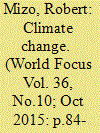

|
|
|
|
|
| Summary/Abstract |
Climate change warrants committed action from governments. No nation can afford to ignore the issue any longer given the ripening science behind it and the growing international attention. China and India have been under keen spotlight in the arena of international climate politics. This is because the two countries are major developing economies with rising emissions rates comparable to those of the developed west.[1] China and India share varied challenges emanating from the climate problem because they have to simultaneously grapple with issues typical to the third world. As developing economies, the two nations have to address the calls of human security, poverty, unemployment, development, etc. Addressing the problem of climate change is bound to shape how these countries plan to grow and develop in the future. In charting out their responses to climate change as developing countries with unique national circumstances, China and India have adopted certain ideational principles.
|
|
|
|
|
|
|
|
|
|
|
|
|
|
|
|
| 7 |
ID:
141236
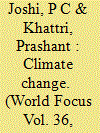

|
|
|
|
|
| Summary/Abstract |
The present article tries to locate the climate change diplomacy and politics within the larger framework of history and culture. Historical roots of climate change diplomacy are linked with scientific discoveries and a North-South geo-political binary. The climate change diplomatic negotiations are located within the backdrop of cultural theory and grand narratives of different geographical spaces. Broadly there are three cultural narratives regarding climate change that originate at different places and attribute different causes for climate change and hence float different solutions to tackle the problem. The contemporary mantra for a climate deal should be an integration of various narratives and stories rather than the competition of claiming one or the other as the main narrative and ignoring the other.
|
|
|
|
|
|
|
|
|
|
|
|
|
|
|
|
| 8 |
ID:
141243
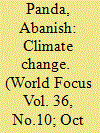

|
|
|
|
|
| Summary/Abstract |
Climate change is the result of global warming, which in turn is due to burning fossil fuels for steam and electricity generation. Accumulation of anthropogenic carbon dioxide in the earth atmosphere causes greenhouse effect. Disastrous consequences are melting of glaciers, snow and ice sheets, rise in sea level, changes in rainfall pattern, frequent extreme weather events, heat waves, droughts, flash floods, yield loss of crops, ocean acidification, loss of biodiversity, land inundation, etc. Mitigation methods are fuel switching to renewable energy sources such as wind, solar, biomass and nuclear for energy generation. With the new mandate of Obama administration to switch over to renewables of coal based power plants in the US, the difference in appropriate response to climate change between Europe and North America will recede. This, if implemented, would usher a new lease of hope for the present and future generations.
|
|
|
|
|
|
|
|
|
|
|
|
|
|
|
|
| 9 |
ID:
141249
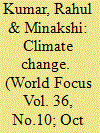

|
|
|
|
|
| Summary/Abstract |
The issue of climate change is one of the most vehemently debated topics in the national and international domain and it has its impact in almost all sectors of human existence, be it on health, economy, and environment and so on. According to United Nations Framework Convention on Climate Change (UNFCCC), change in climate is in one way or the other linked with human activity. It defines climate change as the change that can be attributed “directly or indirectly to human activity that alters the composition of the global atmosphere and which is in addition to natural climate variability observed over comparable time periods” A slightly different approach is adopted while defining climate change by Intergovernmental Panel on Climate Change (IPCC). IPCC has defined climate change as “change in the state of the climate that can be identified by changes in the mean and/or the variability of its properties, and that persists for an extended period, typically decades or longer. It refers to any change in climate over time, whether due to natural variability or as a result of human activity.
|
|
|
|
|
|
|
|
|
|
|
|
|
|
|
|
| 10 |
ID:
170815
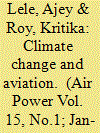

|
|
|
| 11 |
ID:
088480
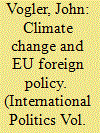

|
|
|
|
|
| Publication |
2009.
|
| Summary/Abstract |
The European Union has established itself as the leader of attempts to construct a global climate change regime. This has become an important normative stance, part of its self-image and international identity. Yet it has also come to depend on the Union's ability to negotiate internally on the distribution of the burdens necessitated by its external pledges to cut emissions. The paper considers institutionalist hypotheses on cooperative bargaining and normative entrapment in EU internal negotiations before the 1997 Kyoto Protocol negotiations and the more recent approach to negotiations on a post-2012 regime. It finds that there is evidence to support the normative entrapment hypothesis in both cases, but that agreement in 1997 was facilitated by a very favourable context associated with a 1990 baseline.
|
|
|
|
|
|
|
|
|
|
|
|
|
|
|
|
| 12 |
ID:
141255
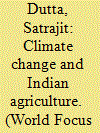

|
|
|
|
|
| Summary/Abstract |
Greenhouse effect is a natural process that produces the relatively warm and hospitable environment near the earth’s surface where humans and other life-forms have been able to develop and prosper. It is about non-normal variations to the climate mainly due to increased anthropogenic activities such as industrialisation, urbanisation, deforestation, agriculture, change in land use pattern etc. that leads to emission of increased level of green house gases (GHGs- carbon dioxide (CO2), water vapor (H2O), methane (CH4), nitrous oxide (N2O), hydrofluorocarbons (HFCs), perfluorocarbons (PFCs), and sulfur hexafluoride (SF6) etc.) which makes the rate of climate change much faster and so also its effects on Earth. The risk of climate change is largely a function of total cumulative GHGs in the atmosphere.
|
|
|
|
|
|
|
|
|
|
|
|
|
|
|
|
| 13 |
ID:
105336
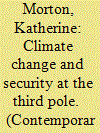

|
|
|
|
|
| Publication |
2011.
|
| Summary/Abstract |
The consequences of global climate change present a serious strategic challenge in one of the most remote parts of the world. The Tibetan Plateau is the largest high-altitude landmass on earth, with more than 45,000 glaciers that feed the major river systems in Asia, which, in turn, support 40 per cent of the world's population. Temperatures in the region are rising twice as fast as the global average, posing serious risks to hydrological systems, agriculture, and critical infrastructure. Looking at regional cooperation through the lens of ecological security raises important questions about the extent to which the threat of large-scale climate-related disaster could trigger new forms of cooperative action. The sobering reality is that current responses fall far short of ensuring a mutually secure future.
|
|
|
|
|
|
|
|
|
|
|
|
|
|
|
|
| 14 |
ID:
141235
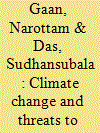

|
|
|
|
|
| Summary/Abstract |
What has rendered realist and neo-realist paradigm of security premised on state and its corresponding institutions redundant is the climate change. The source of security threats no longer lies with the state. The debate over the direct connection between climate change and security harks back to the day security threats were outsourced to non-military and non-traditional elements. There are skeptics who maintain that climate factors will only marginally influence tomorrow’s security environment, if at all. They point to significant natural fluctuations in climate patterns and short-term cyclical phenomena like El Nino and the recently identified Pacific Decadal Oscillation, the causes of which are not fully understood and deciphered. In their opinion, even if global warming does take place, many of its effects may be localized, benign or favourable.
|
|
|
|
|
|
|
|
|
|
|
|
|
|
|
|
| 15 |
ID:
118185
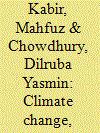

|
|
|
| 16 |
ID:
141244
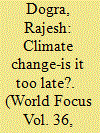

|
|
|
|
|
| Summary/Abstract |
The exact amount of climate change that is caused by human activities is not clear. However, it is clear that increasing greenhouse gas emissions result in warmer global temperatures and those human activities produce greenhouse gases. While climate change may not be caused by human activities alone, it is very likely that the changes observed during the last 50 years are not simply the result of natural causes. Is it too late to become part of the solution? No. We already have the knowledge and tools to start making changes.
|
|
|
|
|
|
|
|
|
|
|
|
|
|
|
|
| 17 |
ID:
099051


|
|
|
|
|
| Publication |
2010.
|
| Summary/Abstract |
In this article, we depict climate as an issue which deterritorialises existing geopolitical realities in a manner which suits the discourses of both elite science and corporate globalisation. In this deterritorialisation, the politics of place, of difference, are removed; the divisions between North and South - the Minority and Majority Worlds - must melt away as all peoples become citizen-consumers in need of a morally conservative (using global archetypal myths of flood and fire) but economically neo-liberal global soul with which to confront the global nemesis of climate change. This deterritorialisation is constructed from a Northern (particularly a Western European) position. It emerges from post-material and post-industrial environmental discourses, largely ignoring the discourses and frames of post-colonial environmentalism (and environmental debt) which are far more appropriate when describing the environmental and developmental realities of the Global South. In the article, we introduce the case of India, as both its civil society and governments wrestle with the new realities of the global climate change agenda. We show how India's official framing of climate change discourse, overwhelmingly dictated and driven by the imperatives of economic growth, continues to oscillate between the 'scientific' underpinnings of deterritorialised-global representations of climate change and the growing trends to reterritorialise multifaceted climate space through geopolitical-geoeconomic reasonings.
|
|
|
|
|
|
|
|
|
|
|
|
|
|
|
|
| 18 |
ID:
141238
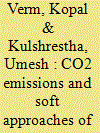

|
|
|
|
|
| Summary/Abstract |
During the last five years, India has achieved to become world’s ninth largest economy with a real GDP growth of 8.7% which is exceptional evidence of the growth of Indian economy [Energy Statistics, 2013]. Such a high economic growth involves enormous pressure on the energy resources of the country resulting in increased demand and supply imbalance across all energy sources. India’s energy basket has mixture of all the resources with the dominance of coal [Energy Statistics, 2013]. Being the capital of India, Delhi is the hub of opportunities for all including youth, entrepreneurs, governments, and the directly or indirectly associated people. This catalyses the processes of migration which is responsible for the growth of population, size of the urban area and industrialization [Aggarwal and Jain, 2014]. This further leads towards increased energy consumption posing serious environmental and human health threats. The worsening air quality of the city is triggering various respiratory problems such as chronic bronchitis, lung cancer and infections etc. Adverse air quality also affects visibility and climate, most of the time making irreversible changes. One such example is climate change which is difficult to cope by `hard’ mitigating methods due to human desires and geographical competitiveness for modern development. Due to these reasons many people believe that our climatic conditions will never be restored into the original form and adaptation is the only option for future generation. However, it is possible to reduce greenhouse gases (GHG) and carbon emissions by `soft’ techniques. Taking into account the consumption of fossil fuels by different sources and their emissions in Delhi National Capital Region (NCR), this article focuses upon the soft approaches to mitigate (GHG) and carbon emissions.
|
|
|
|
|
|
|
|
|
|
|
|
|
|
|
|
| 19 |
ID:
193428
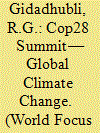

|
|
|
|
|
| Summary/Abstract |
COP28 Summit was held in Dubai in December 2023 in which the Prime Minister of India Mr. Narendra Modi attended during inauguration. Due to rising temperature, climate change has become an important global issue. The world faces risks and threats of magnitude never faced by humanity. Developed countries are mainly responsible for climate crisis as compared to developing countries. There is need to reduce fossil fuel consumption and enhance the role of renewable sources of energy. Developed countries need to fulfill their obligation in the Climate Fund. India has been playing an active role on the climate issue. India has undertaken consistent policy measures contributing towards climate action plan. India is prepared to host the UN sponsored COP Summit in 2028.
|
|
|
|
|
|
|
|
|
|
|
|
|
|
|
|
| 20 |
ID:
131308


|
|
|
|
|
| Publication |
New Delhi, Oxford University Press, 2014.
|
| Description |
vii, 639p.Hbk
|
| Standard Number |
9780198092346
|
|
|
|
|
|
|
|
|
|
|
|
Copies: C:1/I:0,R:0,Q:0
Circulation
| Accession# | | | | | | | | | | | |
| 057787 | 321.80954/HUS 057787 | Main | On Shelf | General | | | | | | | |
|
|
|
|
|
|
|
|
|